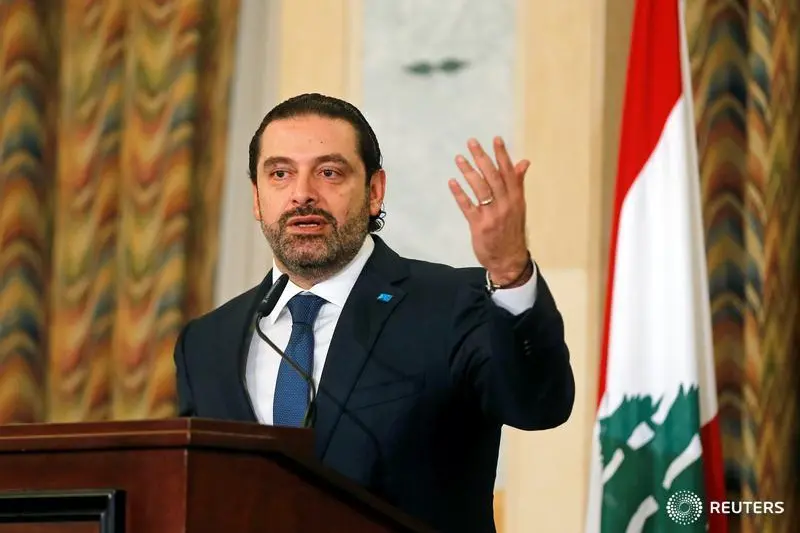PHOTO
BEIRUT - Prime Minister Saad Hariri opened the 9th ArabNet conference Wednesday with an upbeat speech about the promising future of technology and IT in Lebanon, two days after unveiling the $48 million fund for startups. Before an audience of mainly young Lebanese entrepreneurs, Hariri voiced strong support for the country’s tech sector, particularly the new generations of innovators and business leaders.
“With all the problems affecting us and the region, we really need to be united on the agenda that will provide a better future for the youth,” he said. “I want to tell the youth that I rely on them, and all I want to do is try and stabilize this country and update the laws because change is good. Change is for the people.”
He also underscored the importance of technology in enhancing the economy. “One of the technologies is cloning,” Hariri said. “Let’s clone four or five people like [founder and CEO of ArabNet] Omar Christidis, and distribute them throughout Lebanon. We can also reproduce three [Central Bank Governor] Riad Salamehs,” he quipped.
Hariri said artificial intelligence could be useful in Lebanon, firstly in order to prevent corruption, joking that “the problem is that politicians will disagree whether this artificial intelligence is Sunni, Maronite, Orthodox or otherwise.”
Telecommunications Minister Jamal Jarrah used his appearance to announce plans for better internet and mobile phone networks in the coming months, including the development of underwater fiber optic cables between Lebanon and Cyprus and other parts of Europe, as well as better mobile phone reception across the country.
“We have worked to update the network and equipment in a bid to transform the telecommunications sector and pave the way toward establishing a complete FTTH network in the coming years,” he said.
These developments will give young Lebanese the opportunity to excel in the tech sector, where they have already shown they can hold their own in international competitions, Jarrah said.
Salameh spoke about the role of finance in Lebanon’s tech sector, including Circular 331, the banking guarantee for startup investments.
“The Central Bank of Lebanon is preparing to launch the digital currency, which will lead to an important development in the digital economy and will fall under Lebanese law,” he said.
But the governor did not set a date for the launch of the currency.
Describing the current era as undergoing a tsunami of change, Salameh said: “We recognize that the financial sector plays a leading role in the development and modernization of the Lebanese economy. However, growth is largely linked to improving Lebanon’s competitiveness, whereby the knowledge economy plays a significant role.
“Innovation and human capacity are the pillars of the fourth industrial revolution; they are fundamental elements that contribute to improving competitiveness.”
Governments in the region are increasingly seeing innovation and entrepreneurship as the drivers of their countries’ economies.
Similar recent initiatives over the last year include the National Fund for Small and Medium Enterprise (SME) Development in Kuwait, four initiatives by Saudi Arabia’s SME authority (with a budget of $1.9 billion) and the Dubai Future Foundation in the UAE.
“Governments are looking to understand the weaknesses of ecosystems,” said ArabNet founder and CEO Omar Christidis, whose conference started nearly a decade ago as niche tech gathering and has now evolved into a gathering for all types of businesses, as well as both the private and public sectors, as they all integrate into the digital economy.
“What’s really important is the agreement at the highest levels of government that technology is a key sector for the growth of the Lebanese economy,” Christidis said.
“The prime minister’s team has been working closely with the ecosystem to develop a set of findings – priorities and pain points, areas they need to work on to improve the environment for startups. Beyond that, the prime minister has been personally involved – he has met with startups and ecosystem stakeholders multiple times, and this is helping set the tone for the Cabinet about the strategic importance of this sector.”
This show of support comes at a time when Lebanon’s economy is suffering from regional conflict and a domestic recession.
It also comes at a time when the country’s tech ecosystem has evolved from a small community nearly 10 years ago to a thriving scene of talented entrepreneurs, with some companies showing global potential.
However, along with the great strides the sector has made comes a collective frustration over Lebanon’s lack of sufficient infrastructure and government services – as evidenced by daily power outages, slow and expensive internet, and inadequate waste management – as well as its inhospitable business environment, from the high cost and waiting time for opening a firm, to general inefficiency, bureaucracy and rampant corruption.
According to an ArabNet survey of 90 Lebanese tech startups, two out of three face significant challenges with regulations and accessing talent with the right skill sets.
Laws for establishing and closing companies need to be improved, as well as those related to investment (including employee stock options). Technical skills like data analytics and product development are lacking, and universities are not graduating students with these skills.
Respondents said the government needs to simplify and digitize government processes – such as the application process for permits of all kinds – to make doing business easier for startups; 89 percent of startups identified this as the top infrastructural issue they face.
Despite these longstanding obstacles, many Lebanese startups have managed to thrive in an inhospitable environment, tapping into existing resources, such as a strong diaspora network, competitive accelerators and dedicated networking events.
“It’s more difficult to be in Lebanon because of the infrastructure and the bureaucracy. It’s a barrier like any other,” said Georges Abi-Aad, a growth strategist at Birdhaus, a business growth agency based in Beirut.
Copyright © 2018, The Daily Star. All rights reserved. Provided by SyndiGate Media Inc. (Syndigate.info).





















